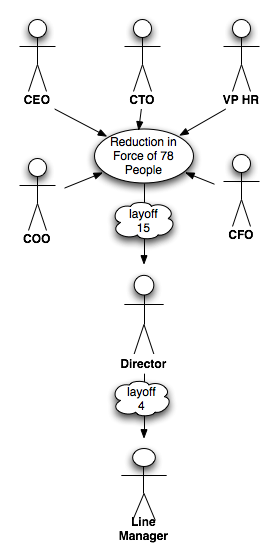My second stint as a manager, about 6 years ago, was leading a team of web developers at a dotcom ecommerce consulting shop called XUMA. We specialized in ATG Dynamo, a java application server you’ve likely never heard of.
Like many, many dotcoms we went through the boom and bust cycle during the 18 months I worked there. I joined a brand new office in Las Vegas as one of three people to found the office and grew the office to almost 50 people before the layoffs started. Those layoff experiences heavily influenced my management style.
We had three rounds of layoffs before it was over. In the first I was asked to layoff 4 people. At the time I had a staff of 8 people so 50%. For those managers who haven’t had the experience of managing through a layoff it works pretty much like this:

The timing couldn’t have been better as I had just staffed up four new people in the two prior months to bring my team up to 8 people. Some of them had actually moved across several states to take their new jobs. This was early December of 2000.
I had to make some fast, horrible decisions. Lay off a solid performer who had proved themselves or lay off a new employee who interviewed really well, but never got to work on a project. It was a gut wrenching experience, so much so that one of managers in the office threw up the morning of the layoffs. By June 2001 we ran through the third round of layoffs and closed down the office.
I came away with the lesson that I had to keep a certain distance, emotional and otherwise, between myself and my employees. At any moment I could be asked to make a layoff decision, so I had to be prepared and not overly connected to my staff. I’ve viewed a lot of things since then through this filter.
In the last year or two at my current job I’ve begun to re-evaluate that lesson. Layoffs will always be around, but you can’t really motivate people if you’re always worried about keeping a certain professional distance. It’s also just not part of my natural optimistic tendencies so it was always hard to keep in place.
If you’re really going to be able to motivate someone you have to know what drives them. And you have to be able to share your own motivations. Keeping your distance just to make layoffs a little easier isn’t worth the tradeoffs.